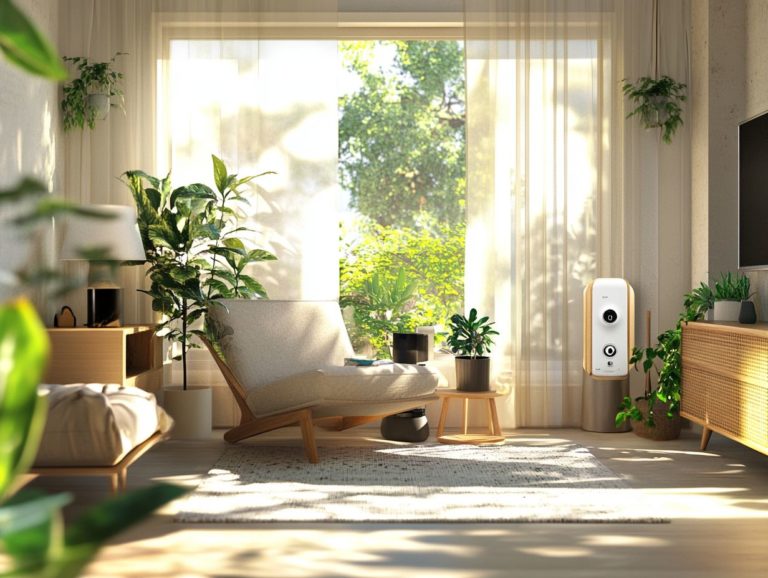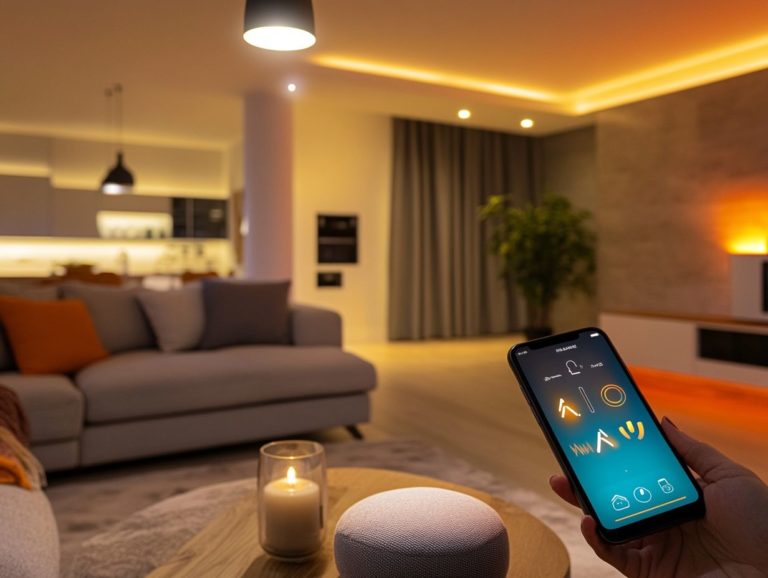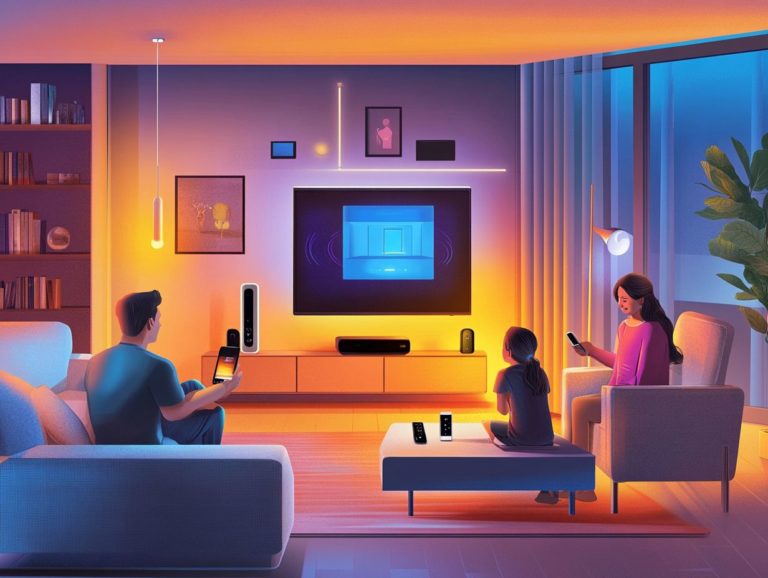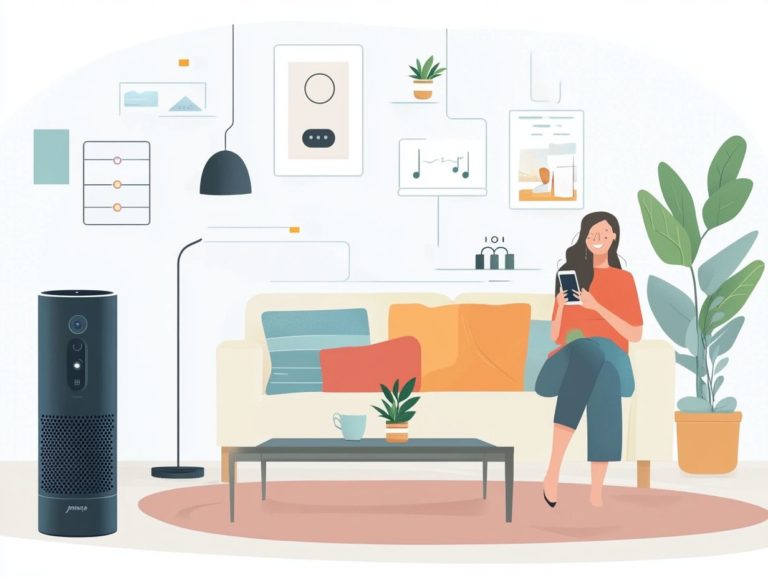How Smart Home Tech is Changing Family Life
Imagine a home that thinks for you! Smart home technology is transforming family life with ease and safety, providing a new level of ease, efficiency, and security.
As these innovations seamlessly integrate into your daily routines, they offer remarkable benefits and notable challenges. From improving safety to simplifying communication, smart devices are significantly altering family dynamics in ways you may not have anticipated.
However, concerns about privacy and costs remain at the forefront of this conversation. This article delves into the ascent of smart home technology, its impact on family life, and what the future may hold for this ever-evolving industry.
Contents
- Key Takeaways:
- The Rise of Smart Home Technology
- Benefits for Families
- Challenges and Concerns
- Impact on Family Dynamics
- Future of Smart Home Technology
- Frequently Asked Questions
- 1. How does smart home tech impact family life?
- 2. What smart home tools can truly make family life easier?
- 3. How does smart home tech promote safety for families?
- 4. Can smart home tech enhance family communication?
- 5. What are some potential drawbacks of incorporating smart home tech into family life?
- 6. How can families ensure they are using smart home tech in a responsible and sustainable way?
Key Takeaways:
- Smart home tech increases convenience and efficiency.
- Enhanced safety features offer peace of mind.
- It changes how families communicate and interact.
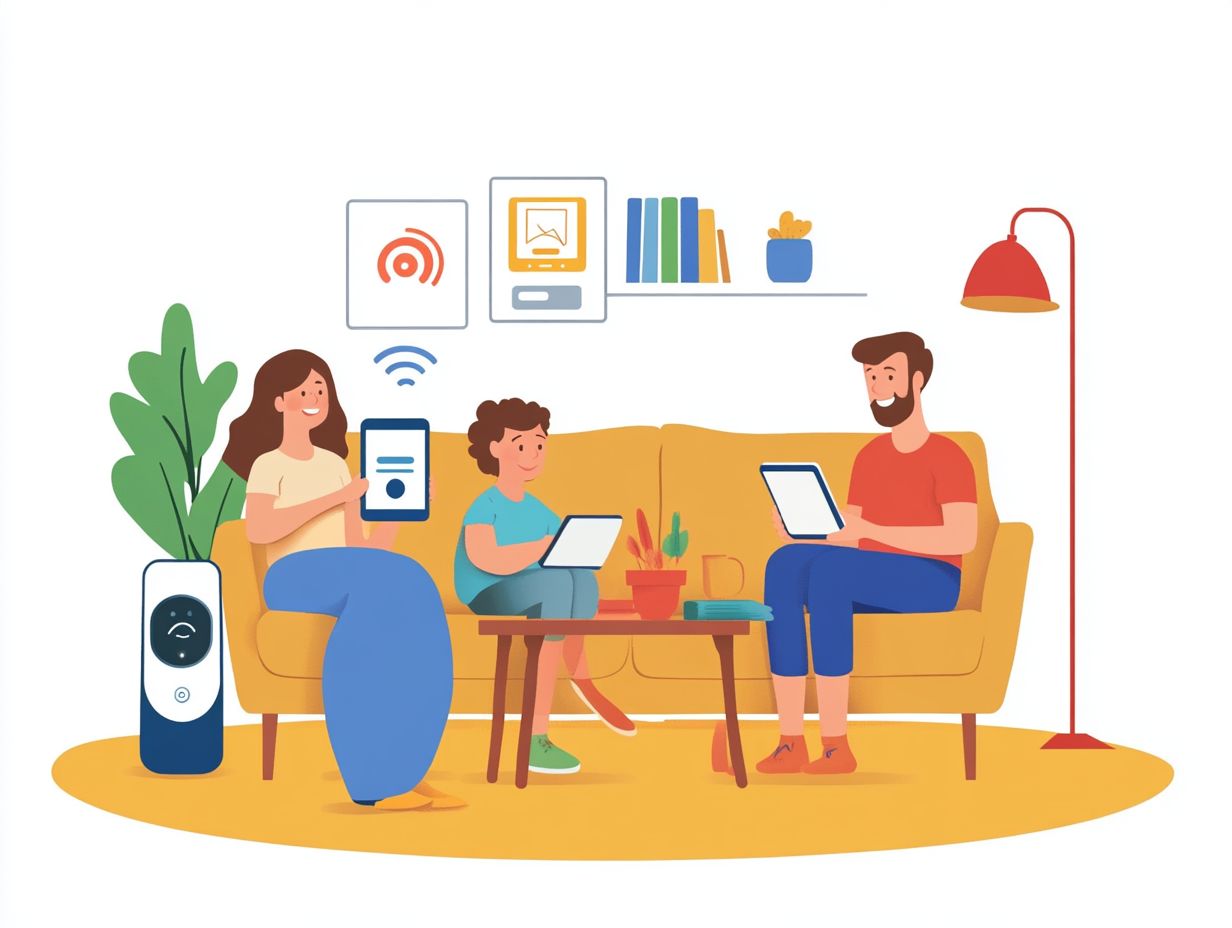
The Rise of Smart Home Technology
In recent years, the emergence of smart home technology has revolutionized how you interact with your living space, significantly enhancing convenience and security.
With the integration of Internet of Things (IoT), which refers to devices connected to the internet, your household can now enjoy seamless connectivity and automation systems that simplify daily routines, offering personalized experiences tailored to your family’s unique needs.
As advancements in Artificial Intelligence (AI), which refers to computer systems that simulate human intelligence, progress, smart homes are becoming even more user-friendly, enabling voice command controls through platforms like Amazon Alexa and Google Assistant. This evolution ultimately paves the way for a more efficient and harmonious family life.
Overview of the Industry
The home automation industry is booming, thanks to increasing consumer demand for smart devices that enhance both convenience and security.
This remarkable growth stems from cutting-edge technology and your growing awareness of energy efficiency. Devices like smart speakers, security cameras, and connected lighting systems have become essential in many homes, catering to a variety of preferences.
Meanwhile, tech giants such as Google and Amazon are not merely vying for market share; they re also investing in innovations that create seamless integrations within their ecosystems. Emerging players are stepping into the spotlight, focusing on niche products that cater to specific consumer needs.
This influx enriches the overall smart home experience and adds an exciting layer of dynamism to the competition.
Benefits for Families
Smart home technology presents an array of benefits for families, transforming how you experience convenience, security, and energy management in your daily life. Imagine automated lighting, smart locks, and health monitoring systems all working in harmony to enhance safety and provide peace of mind.
This allows you to devote more time to what truly matters quality moments with your children rather than getting bogged down by mundane household chores.
Integrating voice command systems like Amazon Alexa and Google Assistant allows you to manage your home effortlessly, offering a customized experience that caters to your unique needs.
Convenience and Efficiency
Smart appliances and automation systems elevate convenience and efficiency in your modern household, seamlessly streamlining daily tasks and optimizing energy usage.
Imagine relying on devices like smart thermostats that intuitively learn your heating and cooling preferences, allowing you to save on energy bills while keeping your home comfortable.
Picture smart refrigerators that keep track of your food inventory and send alerts when you re running low on essentials perfect for simplifying meal planning and minimizing waste.
These innovations not only champion sustainability but also help you stay organized with your daily chores.
By embracing automation, you can synchronize your schedules with smart lighting and speakers, creating a harmonious home environment that boosts productivity and enriches your overall quality of life.
Enhanced Safety and Security
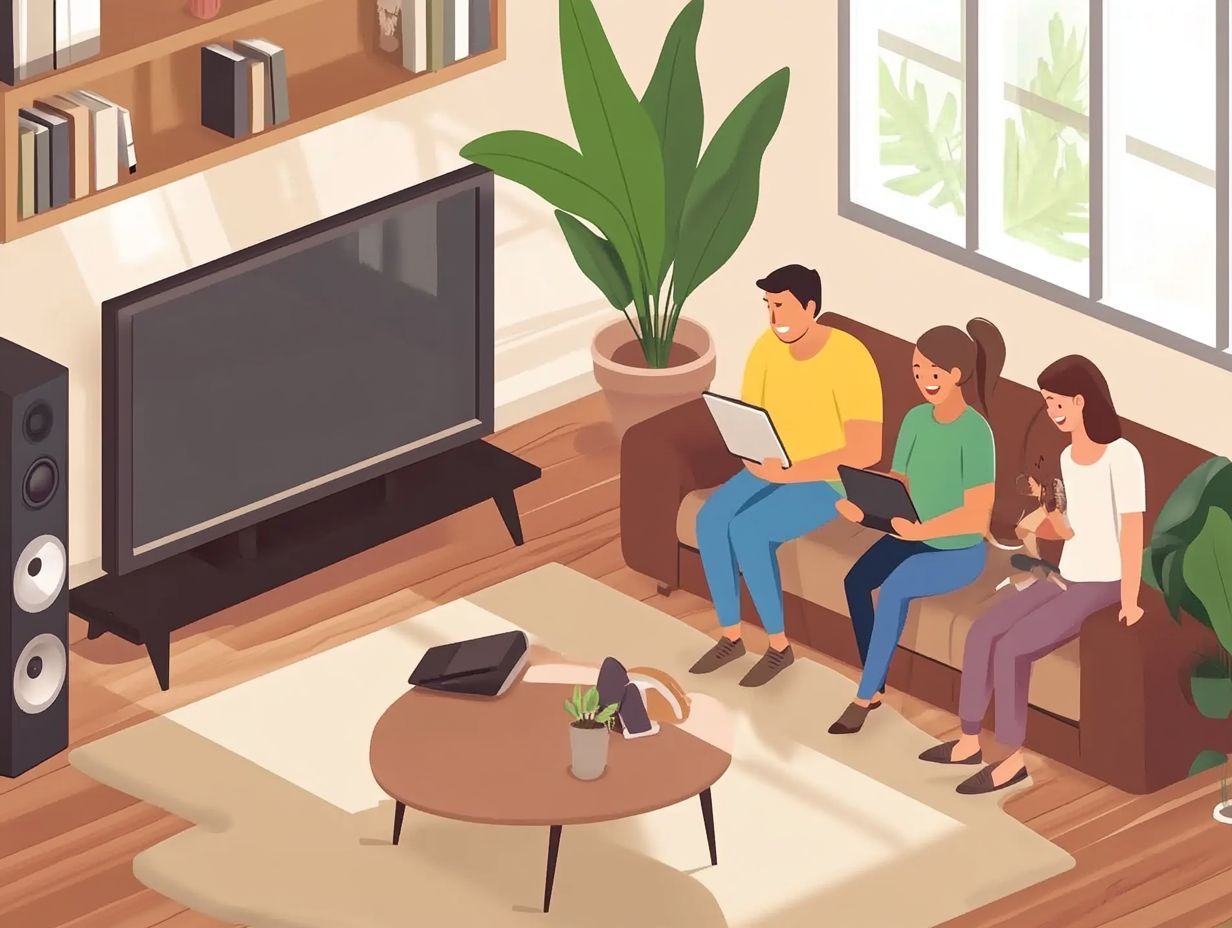
The integration of smart locks and security cameras elevates your home security to new heights. You and your family can enjoy peace of mind with cutting-edge monitoring systems.
These systems provide real-time monitoring, allowing you to keep an eye on your property from virtually anywhere. You ll receive instant alerts for any suspicious activities.
Features like voice activation and remote management give you the power to control access, lock or unlock your doors, and view live feeds of your surroundings all at your fingertips.
Be aware of the potential risks related to data privacy when using these smart solutions. Choosing reliable security products is crucial to protect your personal information. This ensures you can fully enjoy the benefits of smart technology without jeopardizing your safety.
Challenges and Concerns
While smart home technology offers numerous advantages, several challenges and concerns may arise. You ll need to address these issues to truly benefit from home automation.
Data privacy issues and the risk of unauthorized access to personal information can understandably cause apprehension for many consumers. Additionally, the initial investment required for smart devices might discourage some families from embracing a connected home.
Different levels of tech skills among family members can create challenges for seamless technology integration. This may affect both user experience and the optimization of daily routines.
Privacy and Data Security
Privacy and data security should be top priorities for your family when adopting smart home technology. How these devices connect to each other can inadvertently expose sensitive information.
While it’s convenient to control everything from lights to locks via a smartphone app, it comes with risks that may leave your personal data exposed. Recognize that unauthorized access can lead to serious issues like identity theft, financial loss, or even unwanted intrusions into your home.
To mitigate these risks, regularly updating your device firmware is essential. These updates often include crucial security enhancements.
Using strong, unique passwords and enabling a security method that requires two forms of verification can add an extra layer of protection. This ensures that only trusted individuals can access your network.
By prioritizing these security features, you can enjoy the benefits of smart technology while confidently safeguarding your family’s privacy.
Cost and Accessibility
The cost of smart devices and the accessibility of home automation solutions are pivotal factors in your adoption of these technologies. Many families encounter financial hurdles that can make the initial investment feel overwhelming.
However, as various brands introduce more affordable alternatives, you ll find that even budget-friendly devices can deliver substantial benefits. These economical smart gadgets, especially for energy management, can lead to significant savings over time, effectively offsetting those upfront costs.
The rising popularity of smart home technology suggests that more households are recognizing its value. Consumers are increasingly gravitating toward products that enhance sustainability and efficiency. As the market continues to expand, the variety of options available is growing, making it easier for families to embrace smart living without breaking the bank.
Impact on Family Dynamics
Smart home technology is transforming family dynamics by changing how you communicate and organize your daily routines. This enhancement improves both efficiency and connectivity, showcasing how smart technology is changing home design.
As you increasingly depend on voice command systems and interconnected devices for managing tasks, technology becomes a vital ally in improving communication and collaboration among family members.
Additonally, the ability to monitor home activities remotely gives you greater parental oversight. This fosters a more structured and organized household that aligns with contemporary parenting practices.
Changes in Communication and Routines
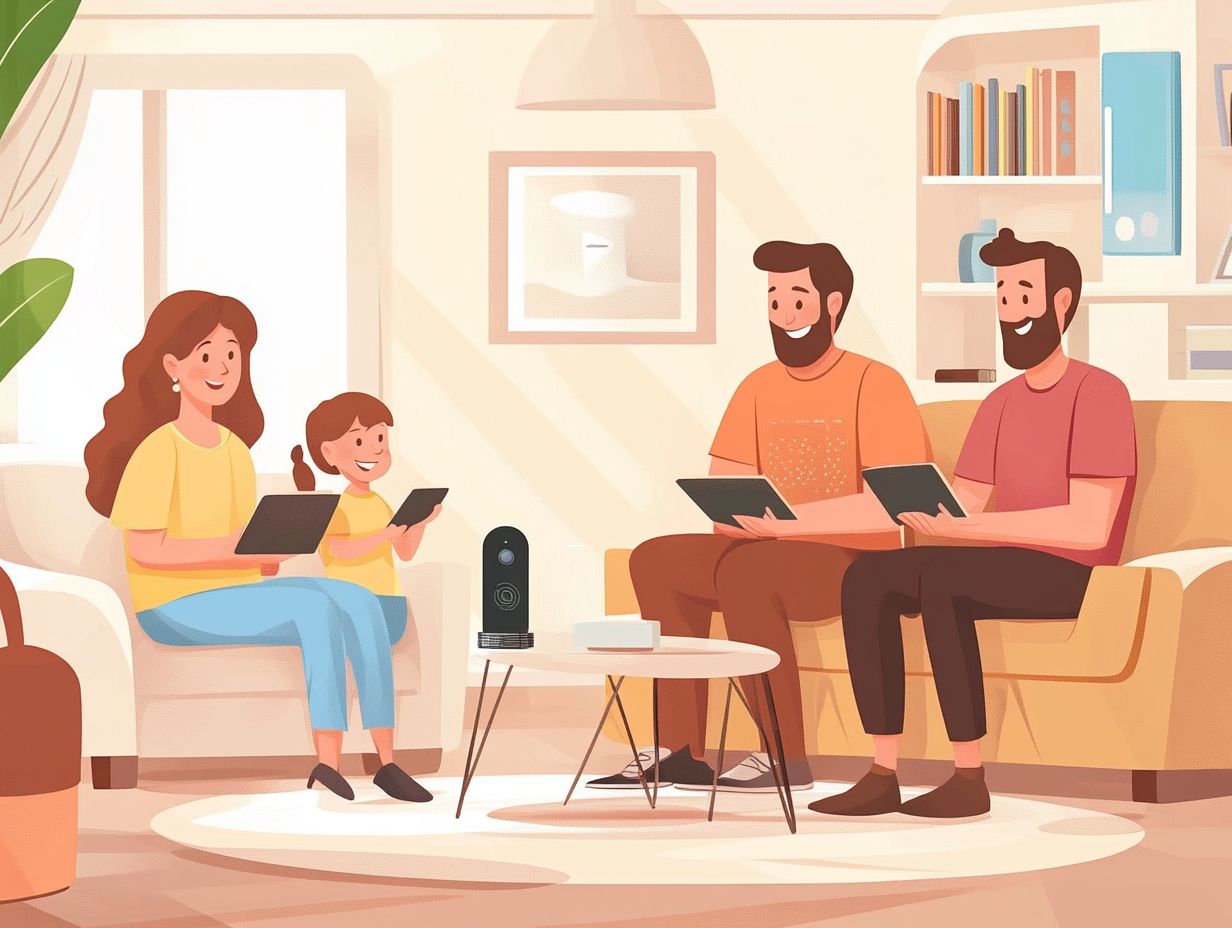
Smart home technology has transformed how families communicate and manage daily routines. This innovation, highlighted in the evolution of smart home technology, creates a seamless flow of information through features like shared calendars and reminders that sync across all devices.
Imagine one family member scheduling a doctor s appointment; everyone else receives notifications, keeping the household in the loop.
Smart speakers and voice assistants can handle family tasks, such as setting up chores or creating grocery lists, making collaboration easy. Embracing these devices enhances communication and optimizes daily routines, leading to better time management and a more organized home life.
Role of Technology in Parenting
Smart home technology is essential for modern parenting, offering invaluable tools such as smart home gadgets for the tech-savvy to assist with health monitoring, scheduling, and managing family life.
You can effortlessly track your children’s vital health metrics through devices worn on the body to monitor health. This ensures you’re ready for timely interventions when needed.
Digital calendars and reminder systems streamline busy family schedules, making it easy to juggle school events, extracurricular activities, and appointments.
Advanced monitoring systems enhance safety by keeping you informed about your children’s whereabouts in real-time.
While these advancements provide significant advantages, finding the right balance is essential for your family’s well-being. Nurturing personal interactions is vital for healthy family dynamics and emotional connections.
Future of Smart Home Technology
The future of smart home technology presents remarkable opportunities for significant advancements in automation, intelligent systems, and robotics. These changes will redefine how families engage with their living spaces.
As you explore a landscape rich with innovations, the integration of AI and robotics into daily life will heighten convenience, optimize energy management, and tailor experiences to your preferences.
Expect smarter, more intuitive devices that adjust effortlessly to your needs, transforming your home into a more responsive and engaging haven.
Predictions and Potential Developments
Predictions suggest a swift evolution in smart home technology, promising a more integrated and user-friendly experience for families.
As devices become interconnected, appliances will communicate seamlessly, creating a harmonious home environment.
Enhancements in voice recognition and gesture controls will offer intuitive user interfaces, making navigation easy for everyone, regardless of tech expertise.
Advancements in artificial intelligence will personalize your experiences, predicting your needs and preferences while learning from your daily routines. This tailored approach will simplify everyday tasks and instill a sense of security and comfort.
Ultimately, this shift will guide market trends toward more holistic smart living solutions, catering to the diverse dynamics of modern families.
Frequently Asked Questions
1. How does smart home tech impact family life?

Smart home tech can greatly simplify daily routines and tasks for families. It enhances communication, safety, and convenience, making it easier for family members to stay connected and manage responsibilities. Exploring the best smart home products for families can further improve your household experience.
2. What smart home tools can truly make family life easier?
Smart thermostats, virtual assistants, security systems, and automated lighting are just a few examples of smart home tech that positively impact family life. If you’re interested in learning how to upgrade your home with smart tech, these devices assist with temperature control, household management, and even entertainment.
3. How does smart home tech promote safety for families?
Smart home tech can improve safety in several ways. Smart security systems provide remote monitoring and control.
Smart locks allow family members to enter the home securely without keys. This feature gives parents peace of mind when their children are home alone.
4. Can smart home tech enhance family communication?
Yes, smart home tech can make it easier to communicate among family members. Virtual assistants can send reminders and messages or even initiate hands-free calls.
Stay connected with your family in real-time! This technology helps busy families stay on top of their schedules.
5. What are some potential drawbacks of incorporating smart home tech into family life?
One potential drawback is the learning curve associated with new technology. Family members may need time to get comfortable using smart devices.
Privacy concerns may arise when using devices that listen or record data. It’s crucial to be aware of these issues.
6. How can families ensure they are using smart home tech in a responsible and sustainable way?
Families can start by researching and selecting devices that align with their values and needs. Setting limits and boundaries on device usage is also essential.
Regularly reviewing and adjusting settings ensures privacy and security. Additionally, recycling or properly disposing of old devices minimizes environmental impact.


